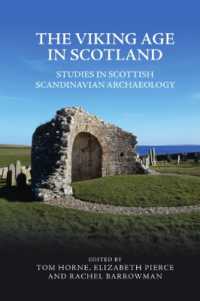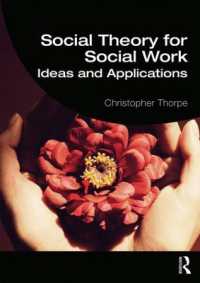- ホーム
- > 洋書
- > 英文書
- > Nature / Ecology
基本説明
New in paperback. Hardcover was published in 2004. Winner of th Prize in Atlantic History, American Historical Association. Explores the movement, triumph, and extinction of knowledge in the course of encounters between Europeans and the Caribbean populations.
Full Description
Plants seldom figure in the grand narratives of war, peace, or even everyday life yet they are often at the center of high intrigue. In the eighteenth century, epic scientific voyages were sponsored by European imperial powers to explore the natural riches of the New World, and uncover the botanical secrets of its people. Bioprospectors brought back medicines, luxuries, and staples for their king and country. Risking their lives to discover exotic plants, these daredevil explorers joined with their sponsors to create a global culture of botany.
But some secrets were unearthed only to be lost again. In this moving account of the abuses of indigenous Caribbean people and African slaves, Schiebinger describes how slave women brewed the "peacock flower" into an abortifacient, to ensure that they would bear no children into oppression. Yet, impeded by trade winds of prevailing opinion, knowledge of West Indian abortifacients never flowed into Europe. A rich history of discovery and loss, Plants and Empire explores the movement, triumph, and extinction of knowledge in the course of encounters between Europeans and the Caribbean populations.
Contents
* Acknowledgments * Introduction *"The Base for All Economics" * Plan of the Book *1. Voyaging Out * Botanistes Voyageurs * Maria Sibylla Merian * Biopirates * Who Owns Nature? * Voyaging Botanical Assistants * Creole Naturalists and Long-Term Residents * Armchair Botanists * The Search for the Amazons * Heroic Narratives *2. Bioprospecting * Drug Prospecting in the West Indies * Biocontact Zones * Secrets and Monopolies * Drug Prospecting at Home * Brokers of International Knowledge *3. Exotic Abortifacients * Merian's Peacock Flower * Abortion in Europe * Abortion in the West Indies: The Colonial Sexual Economy * Abortion and the Slave Trade *4. The Fate of the Peacock Flower in Europe * Animal Testing * Self Experimentation * Human Subjects * Testing for Sexual Difference * The Complications of Race * Abortifacients *5. Linguistic Imperialism * Empire and Naming the Kingdoms of Nature * Naming Conundrums * Exceptions: Quassia and Cinchona * Alternative Naming Practices * Conclusion: Agnotology * Notes * Bibliography * Index






